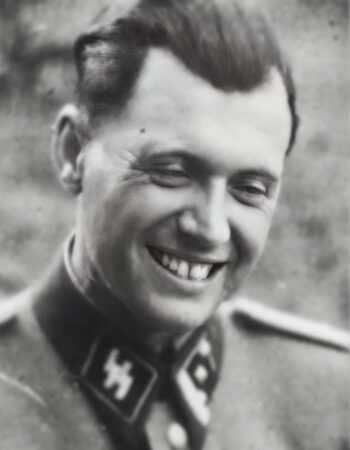Mengele, Josef

Josef Mengele (16 March 1911 – 7 Feb. 1979), SS Hauptsturmführer, had two PhD titles, one in anthropology, and the other in medicine. From mid 1940 to mid 1942, he served as a medical officer behind the front line. Due to serious injuries incurred in mid 1942, he was declared unfit for military duty. After his recovery, he was assigned to the Auschwitz Camp on 24 May 1943. He arrived there on 30 May, and took over the position of camp physician at the Gypsy Camp on 17 June of that year (Auschwitz-Birkenau, Sector BIIe).
On 13 December 1943, Mengele was successfully recommended to receive the War Merit Cross 2nd Class, with the following reasons given:
“He has particularly distinguished himself in the fulfillment of the [tasks] assigned to him and, beyond his service, has still been active with urgent scientific problems in the research of the racial affiliation of the Gypsies. In addition, he has regularly collaborated in the completion of special tasks. In the course of his medical duties in combating the severe typhus epidemic in Auschwitz CC, he became infected himself and contracted a very severe typhus disease, after he had already contracted severe malaria in June/July 1943, also in the course of his duties at Auschwitz CC.” (See Mattogno 2023, Part 1, p. 375.)
On 19 August 1944, his boss, the garrison physician of the Auschwitz Camp, Dr. Eduard Wirths, wrote a professional evaluation of Mengele, in which he stated:
“Dr. Mengele has an open, honest, firm character. He is absolutely reliable, upright and straight. In his appearance he shows no weakness of character, opinions or addictions. He acquired his knowledge during his work in Auschwitz CC practically and theoretically as a camp physician in the fight against serious epidemics. With prudence, perseverance and energy he fulfilled all the tasks assigned to him, often under the most difficult conditions, to the complete satisfaction of his superiors, and showed himself ready to face any situation.
In addition, as an anthropologist, he has eagerly used the short time he had left off duty to further his own education, and has made a valuable contribution to anthropological science in his work by evaluating the scientific material available to him on the basis of his official position. His achievements are therefore to be described as outstanding. […] He is catholic. […] In the most conscientious performance of his medical duties, he contracted typhus while fighting the epidemic in Auschwitz. […]
In addition to his medical knowledge, Dr. M. possesses special knowledge as an anthropologist. He appears quite suitable for any other assignment and also for the next higher assignment. He has no criminal record. As an SS doctor, he is popular and respected everywhere [even among inmates…].” (Ibid., p. 447)
Israeli historian Efraim Zuroff discovered that Mengele’s image among former Auschwitz inmates who were interviewed right after the war was rather harmless. His image as the “Angel of Death,” who is said to have committed unspeakable atrocities, particularly on twin children, has evolved only slowly over the decades (Zuroff 1994, pp. 127f.). In the same vein, the German professional “Nazi hunter” Adalbert Rückerl mentioned once in passing that witnesses in Australia, where media and educational campaigns about the Holocaust had been virtually non-existing for the first three decades after the war, could no longer remember any details of what happened in the camps during the war, quite in contrast to witnesses in Europe, the USA, and Israel where the Holocaust had always been a topic of public discourse (Rückerl 1984, pp. 258f.). The Times of Israel wrote about historians realizing that something is wrong when almost every Auschwitz survivor testifying in later years was convinced that it was Mengele who selected them for this or that fate (Mark 2020).
In other words, witnesses testifying many years or even decades after the war about Mengele and alleged events associated with him are rarely truthful, but at best suffering from false memory syndrome, repeating clichés that have grown increasingly imposing over the decades, as step by step the entire globe embraced the orthodox horror tales about Auschwitz.
Research into the fate of the twin children who were the object of Mengele’s anthropological studies at Auschwitz shows that most of them actually survived the war unharmed. In fact, the survival rate among these twins was much higher than that of the average Auschwitz inmate. In other words, Mengele protected these children and made sure they had a good chance of survival. (For details, see Mattogno 2020a, pp. 383-407.)
After the war, Mengele fled to Argentina, and later lived in Paraguay and Brazil. He drowned while swimming in the ocean at the age of 67, thus managing to escape the show-trial fate of many of his colleagues. Perhaps in part for this reason, Mengele has become the victim of the greatest campaign of character assassination the world has ever seen.
The following is a list if witnesses discussed in this encyclopedia who claimed to have encountered Mengele at Auschwitz:
- Charles Bendel
- Regina Bialek
- Milton Buki
- Leon Cohen
- Szlama Dragon
- Berthold Epstein and three other professors
- Joseph Hirt
- Stanisław Jankowski
- Hermine Kranz
- Sofia Litwinska
- Henryk Mandelbaum
- Filip Müller
- Miklós Nyiszli
- Dov Paisikovic
- Rajzla Sadowska
- Shlomo Venezia
- Franz Süss
- Henryk Tauber
- Janda Weiss
- Elie Wiesel
- Otto Wolken

You need to be a registered user, logged into your account, and your comment must comply with our Acceptable Use Policy, for your comment to get published. (Click here to log in or register.)